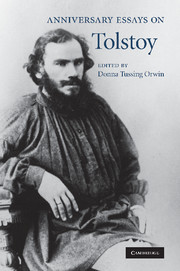Book contents
- Frontmatter
- Contents
- Acknowledgments
- List of contributors
- Introduction
- 1 Tolstoy and music
- 2 Sublime vision and self-derision: the aesthetics of death in Tolstoy
- 3 Tolstoy's peaceable kingdom
- 4 Leo Tolstoy: pacifist, patriot, and molodets
- 5 Leo Tolstoy's correspondence with Nikolai Strakhov: the dialogue on faith
- 6 The worm of doubt: Prince Andrei's death and Russian spiritual awakening of the 1860s
- 7 Tolstoy's spirituality
- 8 Tracking the English novel in Anna Karenina: who wrote the English novel that Anna reads?
- 9 Violence and the role of drama in the late Tolstoy: The Realm of Darkness
- 10 What men quote by: Tolstoy, wise sayings, and moral tales
- 11 The “proletarian lord”: Leo Tolstoy's image during the Russian revolutionary period
- Bibliography
- Index
7 - Tolstoy's spirituality
Published online by Cambridge University Press: 03 May 2010
- Frontmatter
- Contents
- Acknowledgments
- List of contributors
- Introduction
- 1 Tolstoy and music
- 2 Sublime vision and self-derision: the aesthetics of death in Tolstoy
- 3 Tolstoy's peaceable kingdom
- 4 Leo Tolstoy: pacifist, patriot, and molodets
- 5 Leo Tolstoy's correspondence with Nikolai Strakhov: the dialogue on faith
- 6 The worm of doubt: Prince Andrei's death and Russian spiritual awakening of the 1860s
- 7 Tolstoy's spirituality
- 8 Tracking the English novel in Anna Karenina: who wrote the English novel that Anna reads?
- 9 Violence and the role of drama in the late Tolstoy: The Realm of Darkness
- 10 What men quote by: Tolstoy, wise sayings, and moral tales
- 11 The “proletarian lord”: Leo Tolstoy's image during the Russian revolutionary period
- Bibliography
- Index
Summary
Perhaps no aspect of Tolstoy's vast oeuvre is more complicated or controversial than his spirituality. His large fictional narratives from Childhood through Anna Karenina derive much of their charm and a great deal of their intellectual intensity from his characters' agonized searches for the meaning of life. And from 1879 to his death in 1910 Tolstoy concentrated his attention almost exclusively on spiritual matters. His so-called “spiritual writings” – the “religious philosophical tracts” of the 1880s and 1890s, the compendia of 1903–10, and various fictional narratives, including the last great novel Resurrection – spelled out his views on such questions as the ethical content and truth of Christianity, the shortcomings of the Orthodox Church in Russia, the arbitrariness and violence of the Russian state, the hypocrisy and corruption of Russian society, the spiritual bankruptcy of modern ideologies, the meaning of life and death for ordinary Russians, and the common legacy of major world religions. Given the comprehensiveness of his spiritual vision, none of the “vexed questions” haunting Russian public life escaped his attention, yet his answers to these questions, expressed with his trademark erudition and clarity, engendered bitter disagreement. Secular readers like the novelist Ivan Sergeevich Turgenev condemned Tolstoy's spiritual writings for their “reliance on false premises” and their “dark negation of everything vital in human life.” On the other hand, the Holy Synod of the Orthodox Church excommunicated Tolstoy in February 1901 for denying eleven Christian dogmas, including the existence of the Trinity, the divinity of Christ, the virgin birth of Mary, and the efficacy of the sacraments.
- Type
- Chapter
- Information
- Anniversary Essays on Tolstoy , pp. 138 - 158Publisher: Cambridge University PressPrint publication year: 2010
- 2
- Cited by



